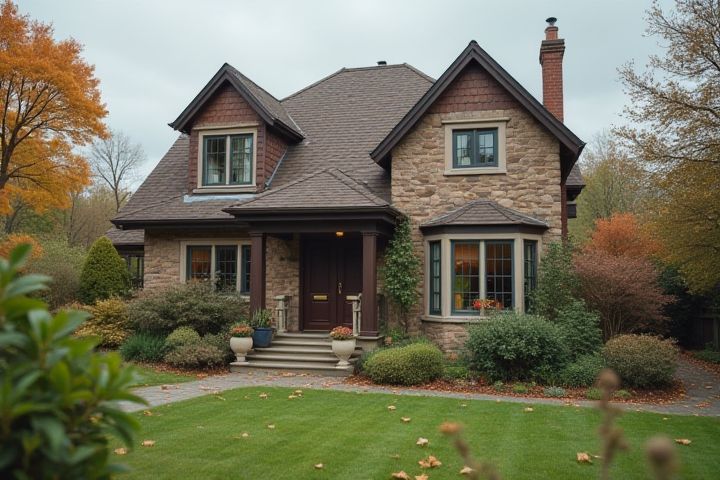
Yes, a house can lose value over time due to various factors. Economic downturns, neighborhood decline, and changes in demand can negatively impact property values. Additionally, poor upkeep, outdated features, or environmental issues such as flooding or pollution can also contribute to depreciation. Market trends, including an oversupply of homes or rising interest rates, can influence a home's worth as well. To maintain or potentially increase your property's value, regular maintenance and updates are essential.
Can A House Lose Value Over Time
Economic downturns
A house can lose value over time, particularly during economic downturns, as property values are often closely tied to the overall health of the economy. For instance, during the 2008 financial crisis, home prices in the United States plummeted by approximately 30% on average, resulting in significant losses for homeowners. Factors such as higher unemployment rates, decreased consumer confidence, and increased foreclosures contribute to declining property values. You may want to monitor economic indicators to assess potential risks to your home's value in the future.
Natural disasters
Natural disasters significantly impact property values, as homes located in areas prone to events like floods, hurricanes, or wildfires may experience depreciation. If your house has a history of damage from such disasters, prospective buyers might perceive it as a risky investment, further driving down its market value. Furthermore, the cost of repairs and increased insurance premiums can deter potential buyers, compounding the loss in value over time. Properties situated in disaster-prone zones might also find it challenging to secure financing, impacting their overall equity and resale potential.
Environmental changes
Houses can lose value over time due to environmental changes such as natural disasters, climate change, and urban development. For instance, properties in flood-prone areas may experience depreciation as potential buyers become increasingly wary of water damage risks. Additionally, rising temperatures can lead to shifts in housing demand, where regions once considered desirable may decline due to heat-related issues. If you own property in an area facing significant environmental challenges, it's essential to stay informed about local regulations and potential mitigation strategies to protect your investment.
Neighborhood decline
A house can indeed lose value over time, particularly due to neighborhood decline, which is often indicated by rising crime rates, increasing vacancy rates, and deteriorating infrastructure. For example, a decline in local schools' performance can lead to a drop in demand, impacting property values by as much as 10-15%. Moreover, when neighbors neglect their properties or when businesses shutter, the area's appeal diminishes, further contributing to a reduced home value. It's essential to monitor neighborhood trends because even well-maintained homes can suffer financially if the surrounding area deteriorates.
Overdevelopment
Overdevelopment can significantly impact a house's value, as increased construction in a neighborhood often leads to oversaturation of the real estate market. For instance, if your area experiences a surge of new housing projects--such as multi-family units or commercial properties--the supply may exceed demand, driving prices down. Studies indicate that properties in regions with high-density developments can depreciate by as much as 15-20% compared to less congested areas. Consequently, it's essential to monitor local zoning changes and development plans to protect your investment and understand potential market fluctuations.
Poor maintenance
Poor maintenance can significantly impact a house's value, leading to a decline that may reach as much as 10% to 15% over time. Neglected roof shingles, peeling paint, and plumbing issues contribute to a negative perception among potential buyers, effectively lowering market demand. Furthermore, continuous deterioration can lead to costly repairs, which, if ignored, may result in further depreciation. Prioritizing maintenance with regular inspections and timely repairs can preserve your property's worth and ensure its long-term value.
Changing market trends
Yes, a house can lose value over time due to changing market trends influenced by various factors. Economic shifts, fluctuations in interest rates, and alterations in neighborhood desirability can all negatively impact property values. For instance, if a community experiences an influx of crime or declining schools, prospective buyers may shy away, driving prices down. It's essential for homeowners to stay informed about local real estate trends to anticipate any potential depreciation in their property's value.
Unfavorable location
A house can lose value over time, particularly when situated in an unfavorable location, such as areas with high crime rates or declining economic conditions. Proximity to unpleasant amenities, like waste disposal facilities or noisy highways, can also detract from a property's appeal. A lack of reputable schools or inadequate public services further reduces desirability, resulting in potential buyers seeking homes in more favorable environments. If you own property in such a location, staying informed about local developments and market trends is essential to assess your home's value accurately.
Legal issues
Yes, a house can lose value over time due to various legal issues. Zoning disputes, for example, can restrict property use, affecting your home's marketability and ultimately its value. Title problems, such as liens or unresolved claims, can significantly decrease buyer interest and create financial uncertainty. Moreover, pending litigation or unresolved boundary disputes can create negative perceptions that hinder property appreciation.
Outdated fixtures and amenities
A house can lose value over time, especially when it features outdated fixtures and amenities. For instance, kitchens with older appliances, dated cabinetry, or worn countertops may detract from a property's appeal, causing it to lag behind similar homes on the market. Bathrooms lacking modern conveniences, such as energy-efficient toilets or high-quality finishes, can significantly lower your home's resale value, especially in competitive real estate markets. Statistics show that properties without updated features can experience a depreciation of 10% to 20%, making it crucial to invest in renovations to maintain your home's worth.
